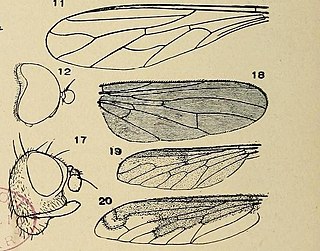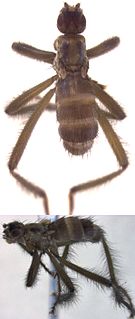
The Coelopidae or kelp flies are a family of Acalyptratae flies, they are sometimes also called seaweed flies, though both terms are used for a number of seashore Diptera. Fewer than 40 species occur worldwide. The family is found in temperate areas, with species occurring in the southern Afrotropical, Holarctic, and Australasian regions.

The Helcomyzidae are a small family of flies in the Acalyptratae. The larvae feed on kelp and other organic matter washed up on shorelines. Species diversity is highest in New Zealand and south temperate South America. They are sometimes allied with the families Dryomyzidae or Coelopidae.

Heterocheila is a genus of acalyptrate true flies (Diptera). They are placed in their own family, Heterocheilidae, in the superfamily Sciomyzoidea. They are not widely familiar outside entomological circles, but the common name "half-bridge flies" has been associated with them. They are medium-sized flies occurring mainly in temperate regions on seashores of the Northern Hemisphere, where they and their larvae typically feed on stranded kelp in the wrack zone. In this, they resemble kelp flies, which are members of a different family, though the same superfamily.

Kelp fly is one common name of species of flies in a number of families of "true flies" or Diptera. They generally feed on stranded and rotting seaweed, particularly kelp in the wrack zone. When conditions are suitable they are very numerous and may be ecologically important in the turnover of organic material on the coast. In this role they also may be an important item in the diet of beach-dwelling animals and birds. The flies most generally referred to as kelp flies are the widely distributed Coelopidae, such as Coelopa pilipes. In popular speech however, they are not clearly distinguished from other flies with similar feeding habits, such as the Heterocheilidae, the Helcomyzinae and sundry members of the Anthomyiidae.

This is a genus of kelp fly in the family Coelopidae. As of 2017, it is monotypic, consisting of its type species This canus. This and T. canus were respectively circumscribed and described in 1991 by the Australian entomologist David K. McAlpine. It is endemic to southern Australia.
Malacomyia is a genus of kelp flies in the family Coelopidae.
Gluma is a genus of kelp flies in the family Coelopidae.
Dasycoelopa is a genus of kelp flies in the family Coelopidae.
Coelopina is a genus of kelp flies in the family Coelopidae.
Chaetocoelopa is a genus of kelp flies in the family Coelopidae.
Lopa is a genus of kelp flies in the family Coelopidae.
Amma is a genus of kelp fly in the family Coelopidae.
Beaopterus is a genus of kelp fly in the family Coelopidae.

Icaridion is a genus of kelp fly in the family Coelopidae.
Coelopella is a genus of kelp flies in the family Coelopidae.
Glumini is a tribe of kelp flies in the family Coelopidae.
Coelopellini is a tribe of kelp flies in the family Coelopidae.
Coelopini is a tribe of kelp flies in the family Coelopidae.
Coelopinae is a subfamily of kelp flies in the family Coelopidae.
Lopinae is a subfamily of kelp flies in the family Coelopidae.





